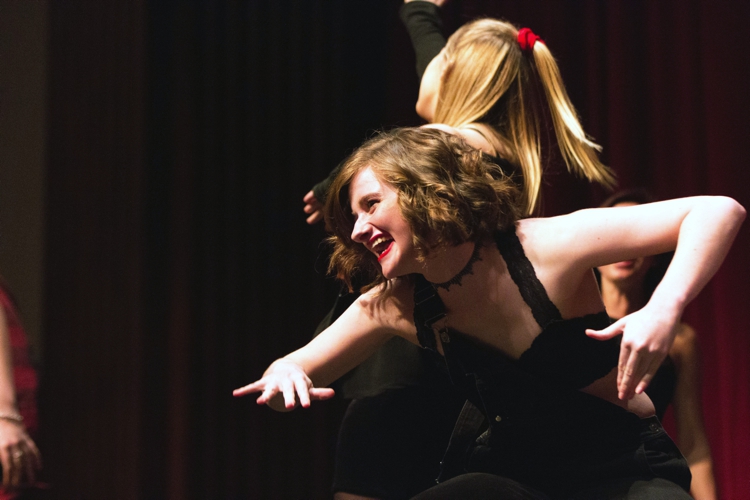Fifteen femmes took the stage at Thorne Hall Feb. 10 to present “The Vagina Monologues: A Show About Femmes.” The performers revealed brutal, provocative, beautiful and heartbreaking truths about the femme experience. All proceeds from ticket and t-shirt sales made by Occidental’s cast of the Vagina Monologues were donated to the Downtown Women’s Shelter and Peace Over Violence. Originally written and produced by Eve Ensler in 1996, the Vagina Monologues have since performed in more than 140 countries, in more than 48 languages. The Vagina Monologues are traditionally tailored, adapted and expanded upon at each venue. The monologues dismantled taboos about women’s bodies, anatomy, autonomy and stories, while simultaneously celebrating and lamenting the female experience.
Co-presidents of the Vagina Monologues at Occidental, Olivia Davis (senior) and Ginny Wyatt (sophomore), began the night by addressing the incident of the removal of Vagina Monologue posters by an unidentified person. This act of vandalism served as a reminder for why the Vagina Monologues is so important— the act attempted to censor femme bodies and, in the process, signaled that they are not accepted. Davis addressed the culprit, saying, “Sorry you can’t handle how bad we are.”
Davis and Wyatt wrote a monologue titled “Femme as in not everyone has a Vagina, motherf******,” which the entire cast performed. They rejected the notion that all women have vaginas from the get go, and created an inclusive, safe space for all femmes.
Juno Hedrick (junior) performed her original, spoken word monologue, “The Cost of Ivory.” Her act dealt with the consequences and violence of colonization and was met with a roaring response from the audience.
“My vagina is angry!” exclaimed Anna Schutte (senior) in her monologue that focused on the invasive, restrictive treatment of vaginas. In “My Short Skirt,” Natalie El-Hai (first year) delivered a poem reminding the audience that provocative clothing is not a justification for sexual violence. El-Hai also discussed her inspiration when performing the piece.
“I thought a lot about my sister, who is 16,” El-Hai said. “The piece reminded me of my own and my sister’s experiences with the policing of our bodies as we grew up.”
“WOC,” an original piece written by Emily Gao, was dedicated to all femmes of color. Through this piece, Gao acknowledged the suffering of fellow WOC’s and stressed the value of intersectionality.
Featured next, Raven Campbell (senior), engaged the audience with a vibrant delivery of the “Period Poem” which celebrated periods while addressing the feelings of shame that are often associated with menstruation. Next, “Anxious Bbys,” performed by seven cast members, highlighted the value of addressing mental illness. They shouted out an explosive ‘f*** you’ to students who use Prozac, Xanax etc. for fun. Following the performance, audience member Mia Coleman (sophomore) explained she could relate to this ensemble piece.
“Too often mental illness is portrayed in a negative light, so to see anxiety literally and figuratively in the spotlight and talked about in a way that was both funny, frank and informative, really meant a lot to me,” Coleman said.
Allison Economou (sophomore) headed downstage with a single chair. In “The Woman who Liked to Make Vaginas Happy,” Economou plays a woman who loves to make women orgasm and reenacted the numerous types of moans that coincide with them. Malena Data Ernani (senior) particularly enjoyed this performance.
“I loved the orgasm skit because it was such an unapologetic display of female pleasure,” Data Ernani said.
After a brief intermission, the spotlights illuminated the entire cast as they dove immediately into “#SayHerName, Really.” They remembered the record number of trans women murdered in 2016, and the women murdered already in 2017, shared personal information about each woman and stressed how important it is to remember them as more than a statistic or hashtag.
Numerous audience members were brought to tears as Davis performed their powerful, original monologue “My Ancestors Taught Me to Smudge Away Heartbreak,” which recalled realities of femmes of color, abuse and mental illness.
“For my Mothers,” written and performed by Wyatt, stirred strong emotions amongst the cast and audience. Her devastating recollection about sexual violence hit close to home for many femmes in attendance. She eloquently summarized Occidental’s campus climate.
“This campus is not safe,” Wyatt said.
“Street Harassment” was performed by four cast members and documented the reality that 99 percent of women have been cat called or harassed on the street. The show concluded with “The Little Coochie Snorcher that Could,” performed by Michaela Graves (first year).
“My monologue is centered around a queer woman’s struggle to love her vagina and own her sexuality after enduring extreme traumas,” Graves said. “I love this piece because it ends on a happy and hopeful note with the promise of redemption.”
The co-presidents took the stage to conclude with final remarks, commenting on the visible solidarity among femmes in attendance. Davis quoted feminist scholar Audre Lorde stating, “Your silence will not protect you.” These 15 femmes were certainly not silent this Friday and offered overwhelming support and inspiration to the campus.
![]()




































